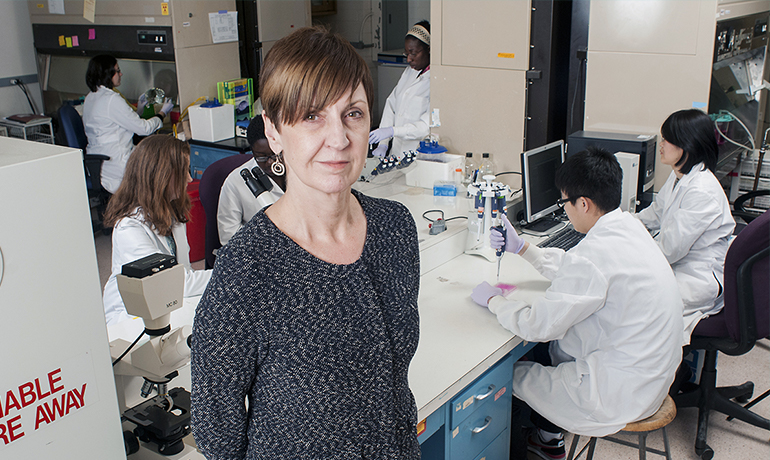
Judy Bolton, PhD, University of Illinois Cancer Center member and distinguished professor and head of the department of medicinal chemistry and pharmcognosy at the University of Illinois at Chicago College of Pharmacy, received the Founders’ Award from the Division of Chemical Toxicology on Sunday at the American Chemical Society’s annual meeting in Boston.
The award was established in honor of the division’s founders and recognizes scientists whose work exemplifies the founders’ vision of excellence in the field of chemical toxicology. Along with winning the award, Bolton presented the Richard Loeppky Lecture, named for the man who began studying nitrosamine chemistry in the mid-1960s. In the ensuing decades, his group used the tools of mechanistic chemistry to shed light on carcinogenic N-nitroso compounds.
Bolton leads an experienced chemical toxicology research team at UIC that is primarily focused on post-menopausal women’s health. She has had two National Institutes of Health-funded projects to examine the carcinogenic effects of estrogens and antiestrogens and investigating natural alternatives to hormone replacement therapy. Bolton’s group is specifically interested in determining why women who are taking hormone replacement therapy or selective estrogen receptor modulators (SERMs) are at increased risk for developing hormone dependent cancers such as breast or endometrial cancers.
“We anticipate that by developing a good understanding of the mechanism of how these widely prescribed drugs lead to increased cancer risk, we will be able to design alternatives that maintain the beneficial properties of estrogens/SERMs without generating genotoxic side effects,” Bolton said. “Our Botanical Dietary Supplements Center is focused on determining whether dietary supplements such as red clover, black cohosh and dong quai with claims of hot flash relief have any efficacy, toxicity or chemopreventive effects.”
The innovative approaches Bolton uses in her laboratory directly address the key issues of mechanisms and prevention of ROS induced estrogen carcinogenesis, which “should allow predictions on breast cancer risk assessment,” she said.
Bolton was also interviewed by C&EN (Chemical & Engineering News). The story will be published in the Sept. 3 issue, but can be read online here.
